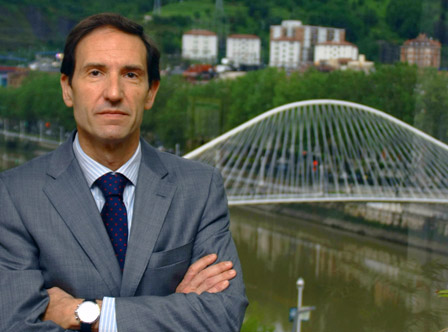INTERVIEW


José Ignacio Hormaeche, current CEO of the Energy Cluster and former CEO of the Basque Energy Board, knows the energy sector inside out. In this interview he spells out some of the points set to play a more significant role in the positioning of the Basque energy sector over the coming years.
1.- How much weight do renewables have in the Basque economy right now and what is their future potential?
In the energy balance for 2012, renewables accounted for 7.6% of the final energy consumption in the Basque Country, and if we are talking about electrical power, 6.3% of the demand for this kind of energy was generated from renewable sources. These figures are way behind the 12% that the Energy Strategy of the Basque Country set as an objective for 2010. In the new Energy Strategy of the Government of the Basque Country, the objective for 2020 is that renewable sources should account for between 14% and 17% (depending on various scenarios) of final energy consumption. However, the achieving of these aims is regarded as increasingly complicated following the moratorium on renewable energy premiums and other fiscal measures affecting power generation, which the Spanish Government has decreed over the last two years.
2.- What position is held by Basque technology in the renewable energy sector internationally?
Fortunately, the technological and commercial capacity of Basque companies in renewable energies is very important, despite the limited presence these technologies have had in our territory. In the Energy Cluster the companies in the renewables sector have a very significant weight, particularly those involved in wind, solar thermal and photovoltaic energy. In the Basque Country we have nearly a hundred companies in the various renewable value chains employing about 9,000 people; nearly 10% of them are involved in R&D projects. And it’s worthwhile highlighting companies positioned internationally with outstanding market shares, like Iberdrola (promotion of renewable plants), Gamesa (wind energy) or Sener (solar thermal).
3.- Do you reckon technologies like parabolic-trough technology on which IK4-TEKNIKER is working could open up new business niches for Basque companies?
Parabolic-trough technology as well as others involving solar concentration like the central tower have undergone considerable development in Spain over the last 4 years, where nearly 2,000 MW of power has been installed in solar thermal concentration (CSP) plants. Countless Basque companies have taken advantage of this market by supplying engineering, components and services for these plants; this has enabled them to acquire considerable know-how and an advantageous competitive position in these technologies. The next challenge facing these companies is a dual one: firstly, to take advantage of their good positioning so that they can offer their solutions on new international markets (Morocco, USA, South Africa, Chile, Middle East, etc.); and secondly, to improve efficiency and cut production costs. It is in this second challenge that the technological advances that IK4-TEKNIKER is developing could be decisive in making manufacturers of equipment and solutions competitive on markets where competition is global.
4.- Are you familiar with the HITECO project? Do you think European projects of this type with a significant presence of Basque organisations could be decisive for positioning the Basque Country as a leading player in renewables?
I am familiar with the work IK4-TEKNIKER is doing within the HITECO project and in the course of various visits to the Centre I have been shown the prototypes and the important results being achieved in relation to optical coating technologies through PVD for solar radiation absorber tubes. As I see it, it is very important for R&D Centres in the Basque Country to be active in international projects of this type; by collaborating with top centres they can develop new technologies and improve the existing ones which they can then make available to our companies.
5.- What role should R&D centres be playing in improving the competitiveness of the Basque energy sector?
Technology has to be one of the differential keys that will enable Basque companies to compete on global markets on the basis of the quality of their products and the added value of their solutions. And in this ongoing challenge to improve competitiveness through technology, R&D Centres must continue to be their best allies (as they have been since they were set up 30 years ago) in capturing knowledge and in applying this knowledge in product and service innovation projects. As far as we are concerned, we at the Energy Cluster are trying to do our bit in this area by encouraging interaction between companies and Centres, by setting up working groups and meeting forums and by breathing new life into collaboration projects.



